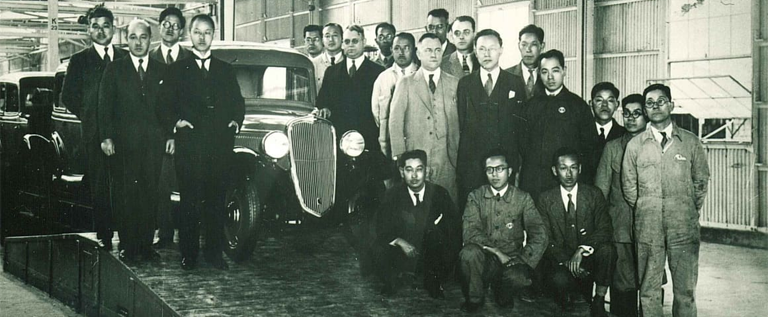Nissan, a name synonymous with Japanese automotive excellence, recently celebrated its 90th anniversary in 2023. This milestone is a testament to the brand’s unwavering commitment to innovation, quality, and customer satisfaction.
From humble beginnings in 1933 to becoming a global automotive powerhouse, Nissan’s journey has been marked by significant milestones. Let’s take a look back at some of the key moments that have shaped the brand we know today.

The Early Years of Yoshisuke Aikawa
Nissan’s roots can be traced back to the early 20th century, when the company began producing automobiles under the name “Datson.” Founded in 1911 by Yoshisuke Aikawa, Datson was a subsidiary of the Tokyo Gas Company. The name “Datson” was derived from the English phrase “son of Dat,” where “Dat” was a nickname for Aikawa.
In the early years, Datson produced small, affordable cars that were popular among Japanese consumers. The company’s first car, the Datson LA, was introduced in 1931. Despite its humble beginnings, Datson quickly gained a reputation for producing reliable and durable vehicles.
Global Expansion and Iconic Models
The 1960s and 1970s marked a period of significant growth for Nissan. The company expanded its operations to international markets, including the United States and Europe. This expansion was fuelled by the success of Nissan’s iconic sports cars, such as the Datsun 240Z and the Fairlady Z.
The Datsun 240Z, introduced in 1969, was a groundbreaking vehicle that helped to establish Nissan’s reputation as a manufacturer of performance-oriented cars. The 240Z offered a combination of power, handling, and affordability that made it a popular choice among sports car enthusiasts.
The Fairlady Z, which was sold in Japan as the Nissan Fairlady, was another iconic model that contributed to Nissan’s global success. The Fairlady Z was a long-running sports car series that featured a variety of body styles and performance options.

A New Era of Innovation
The late 20th century saw Nissan embrace a new era of innovation. The company developed advanced technologies such as variable valve timing and direct injection, which helped improve fuel efficiency and performance. Nissan also introduced a range of electric vehicles, including the Leaf, which became a pioneer in the electric car market.
Nissan’s commitment to innovation was clear in the development of the Nissan Leaf, which was introduced in 2010. The Leaf was one of the first mass-produced electric cars to be offered in the United States and Europe. The Leaf’s success helped to raise awareness of electric vehicles and paved the way for other manufacturers to enter the market.
A Commitment to Sustainability
In recent years, Nissan has focused on developing sustainable mobility solutions. The company has invested heavily in electric vehicles and autonomous driving technologies, with the goal of creating a more environmentally friendly and efficient transportation system.
In addition to the Leaf, Nissan has introduced a range of other electric models, including the e-NV200 and the Ariya. The company has also invested in research and development of autonomous driving technology, with the goal of creating self-driving cars that can reduce traffic congestion and improve safety.
A Daring Milestone: 16 million Engines Produced in Mexico
In 2023, Nissan Mexico reached a monumental achievement: the production of 16 million engines. To celebrate this milestone, Nissan invited journalists to our Aguascalientes Powertrain plant to see the assembly of the 16 millionth engine. The event showcased the skill and dedication of our technicians, who transformed components into engines that power thrilling journeys around the world.

NISMO Festival: Celebrating 50 Years of Skylines and Beyond
The NISMO Festival is a testament to Nissan’s daring pursuit of precision and speed. From the legendary Skylines to the latest in sustainable excitement, such as the carbon neutral fuel (CNF) powered GT500 Z and all-electric Formula E racecar, the festival brought together fans and enthusiasts from around the world to celebrate our racing heritage.
Nissan’s 90th anniversary is a testament to the brand’s enduring legacy and unwavering commitment to innovation. From its humble beginnings as a small Japanese automaker to its position as a global automotive powerhouse, Nissan has consistently pushed the boundaries of technology and design.
As we look to the future, we can expect Nissan to continue to play a leading role in shaping the automotive industry. With a focus on sustainable mobility, electric vehicles, and autonomous driving, Nissan is well-positioned to meet the challenges and opportunities of the 21st century.